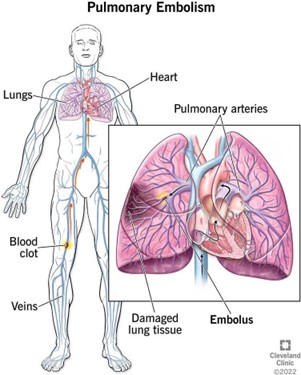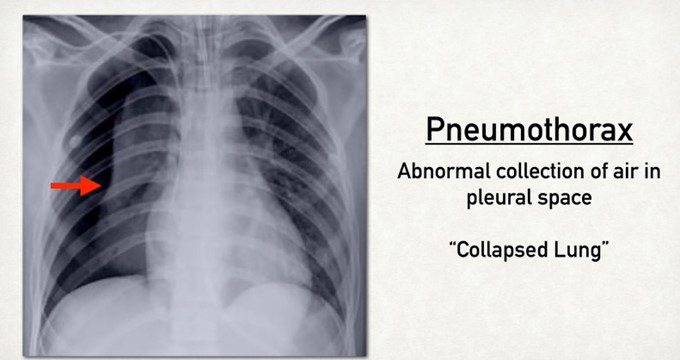A nurse is caring for a client who has just developed a pulmonary embolism. Which of the following medications should the nurse anticipate administering?
Dexamethasone
Atropine
Heparin
Furosemide
The Correct Answer is C
Heparin is an anticoagulant that prevents the formation of new clots and the extension of existing clots. It is the drug of choice for treating acute pulmonary embolism, which is a life-threatening condition caused by a blood clot that travels to the lungs and blocks a pulmonary artery.
a) Dexamethasone is a corticosteroid that reduces inflammation and suppresses immune response. It is not indicated for treating pulmonary embolism, but it may be used for other pulmonary conditions, such as asthma or COPD.
b) Atropine is an anticholinergic that blocks the action of acetylcholine and increases heart rate and cardiac output. It is not indicated for treating pulmonary embolism, but it may be used for bradycardia or asystole.
d) Furosemide is a loop diuretic that increases urine output and reduces fluid volume and blood pressure. It is not indicated for treating pulmonary embolism, but it may be used for heart failure or edema.

Nursing Test Bank
Naxlex Comprehensive Predictor Exams
Related Questions
Correct Answer is D
Explanation
Answer: D. Cheyne-Stokes respirations
Rationale:
A) Stridor: Stridor is a high-pitched, wheezing sound resulting from disrupted airflow in the upper airway. It is not characterized by alternating periods of hyperventilation and apnea, making this choice incorrect.
B) Kussmaul respirations: Kussmaul respirations are deep, labored breaths typically associated with metabolic acidosis, such as diabetic ketoacidosis. These respirations do not exhibit alternating periods of hyperventilation and apnea, so this option is not applicable.
C) Apneustic respirations: Apneustic respirations are characterized by prolonged inhalation followed by a prolonged pause before exhalation. This pattern does not align with the alternating hyperventilation and apnea described, making it an incorrect choice.
D) Cheyne-Stokes respirations: Cheyne-Stokes respirations are characterized by a cyclical pattern of increasing depth and rate of breathing followed by a gradual decrease in depth and a period of apnea. This description matches the client's breathing pattern of alternating hyperventilation and apnea, making this the correct answer.
Correct Answer is B
Explanation
Repositioning the client is the appropriate action for the nurse to take, as chest burning may indicate that the chest tube is kinked, twisted, or compressed, which can impair drainage and ventilation. The nurse should gently move the client to a different position and check that the chest tube is not bent or occluded by clothing, bedding, or furniture. The nurse should also ensure that there are no dependent loops or coils in the tubing and that it is secured to prevent dislodgment.
a) Increasing the client's wall suction is not advisable, as it can cause increased negative pressure in the pleural space and lead to tension pneumothorax. Increasing the wall suction does not affect the patency of the chest tube or the drainage of air or fluid from the lung. The nurse should maintain the wall suction at the prescribed level and monitor for any changes in the suction chamber.
c) Clamping the client's chest tube is not advisable, as it can cause air or fluid accumulation in the pleural space and lead to tension pneumothorax. Clamping the chest tube does not relieve chest burning or improve drainage or ventilation. The nurse should only clamp the chest tube for a brief period of time and under specific circumstances, such as changing the drainage system, assessing for an air leak, or preparing for chest tube removal.
d) Stripping the client's chest tube is not advisable, as it can cause increased negative pressure in the pleural space and lead to tissue damage or bleeding. Stripping the chest tube involves applying manual pressure along the tubing to force out any clots or debris that may obstruct drainage. However, this practice is not recommended, as it can cause more harm than good. The nurse should only milk the chest tube gently and intermittently if ordered by the provider and if there is evidence of obstruction.

Whether you are a student looking to ace your exams or a practicing nurse seeking to enhance your expertise , our nursing education contents will empower you with the confidence and competence to make a difference in the lives of patients and become a respected leader in the healthcare field.
Visit Naxlex, invest in your future and unlock endless possibilities with our unparalleled nursing education contents today
Report Wrong Answer on the Current Question
Do you disagree with the answer? If yes, what is your expected answer? Explain.
Kindly be descriptive with the issue you are facing.
